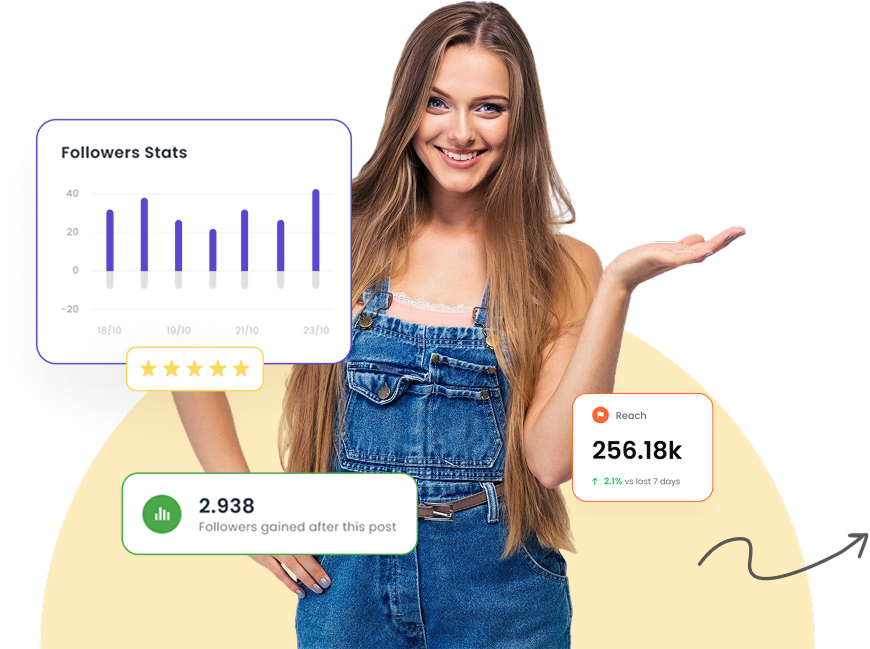Best Social Media Hashtag Generators:
Free AI Tools
Features of RecurPost’s Hashtag Tools
Get smarter hashtag suggestions that actually work and boost your chances of landing on the Explore page.
Real-Time Trend Detection
The system refreshes trending hashtag data every 4 hours, identifying emerging conversations before they peak.
Multi-tier Tag Strategy
Blends discovery, engagement, and niche tags using insights from 7.2M+ daily interactions to boost reach and relevance.
Performance-Verified Selections
Tags are chosen based on real data from 43K+ accounts, showing 23%+ higher engagement in your content category.
How to Use RecurPost’s Hashtag Generators
our hashtag generator.

Get Started Easily
RecurPost simplifies Social Media scheduling, saves you time, and boosts your impact. It takes just minutes to begin.
Frequently Asked Questions
What are social media hashtag generators and how do they help?
Social media hashtag generators like RecurPost are free tools that analyze your content and generate hashtags for platforms like Instagram, Facebook, LinkedIn, YouTube, and many more. They help increase post visibility by suggesting relevant and popular hashtags that match your content and attract the right audience.
Are RecurPost’s social media hashtag generators really free to use?
Yes, RecurPost offers a completely free AI hashtag generator tool that you can use anytime to generate hashtags for your social media posts. It’s among the best hashtag generator tools available, giving you relevant hashtags and fresh ideas without needing any sign-ups or payments.
Can I use RecurPost’s hashtag tools for my business or brand account on social media platforms?
Absolutely. Whether you’re a creator, marketer, or entrepreneur, RecurPost’s hashtag generators are ideal for adding relevant and trending hashtags to social media posts on business accounts across different social media platforms.
Does the hashtag generator stay updated with current hashtag trends on social media platforms?
Yes, RecurPost’s AI hashtag generator updates suggestions in real-time, so you always get trending hashtags and fresh hashtag ideas that fit your niche. This helps the social media hashtag generator deliver results that match current topics, improving your content’s reach and engagement on major social media platforms. It filters selected hashtags based on platform rules.
How is RecurPost better than other generic tools like the Inflact hashtag generator on social media platforms?
Unlike the Inflact hashtag generator, RecurPost offers a smarter AI hashtag generator tool with a focus on relevant keywords. It delivers targeted hashtag ideas based on your content, making it one of the best hashtag generators for Instagram, Facebook, LinkedIn, and other social media platforms.
Hashtag research can be time-consuming, but it doesn’t have to be with RecurPost’s social media hashtag generator.
RecurPost’s AI-powered Hashtag Generator simplifies your social media strategy by suggesting relevant and trending hashtags that help your posts get more visibility across Instagram, LinkedIn, Facebook, and many more platforms. Instead of manually searching for tags, the tool analyzes your content based on the platform you’re using, your topic, target audience, and the latest social media trends.
The result is a list of hashtags designed to expand your reach and boost engagement across major social media platforms.
Tailored Hashtag Suggestions for Every Social Media Platform
What makes RecurPost different is its platform-specific social media hashtag generator. The tool gives you unique suggestions for trending hashtags on:
All of this happens in seconds, powered by advanced AI that understands both your content and the latest trends across social media platforms.
More Than Just Generic Tags
This isn’t about throwing generic hashtags at your posts across social media. RecurPost’s AI selects hashtags that match your audience’s interests and reflect current trending topics people are talking about.
That way, your content becomes more discoverable, and your posts feel more relevant to the trending conversations happening right now.
Hashtags Generator Built for Real-World Social Media Use
RecurPost’s free hashtag generator was created by a team with hands-on social media marketing experience to provide real-world results. The hashtag suggestions are based on what works in practice, not just theory, for all social media platforms.
Getting started with this hashtags generator is easy. Simply input your content or main keyword, and let the AI-powered hashtag generator handle the rest.
With the right relevant hashtags, you’ll:
- Reach more people across social media platforms
- Drive meaningful engagement on platforms
- Grow your brand presence naturally across all major social media platforms
RecurPost reviews show that customers love us
Capterra
4.8 Star Rating
G2
4.6 Star Rating
Category Leaders
2023, 2024 Winners
GetApp
4.7 Star Rating
SaaSworthy
4.6 Star Rating





